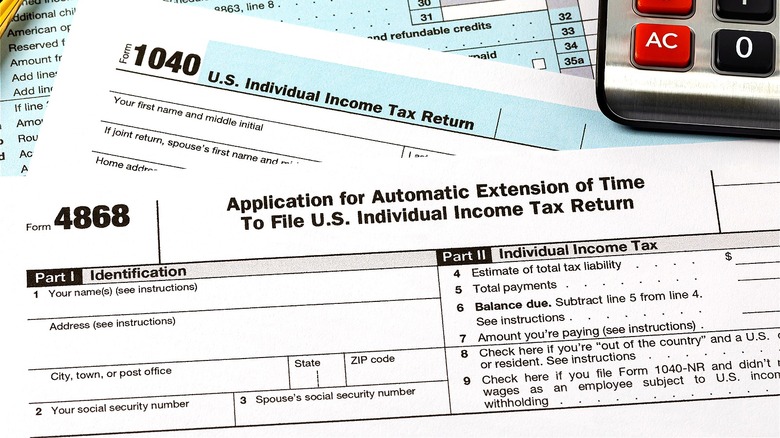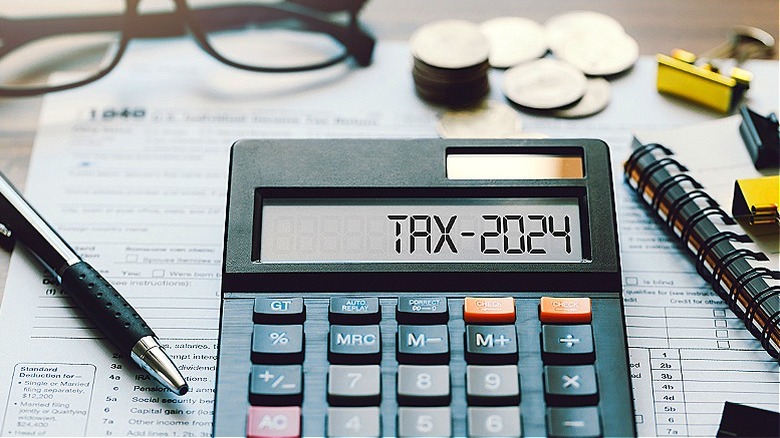How Many Times Can You Ask For An Extension On Your Taxes?
Following a festive holiday season — and maybe one final celebration at a Super Bowl party — it's time for most Americans to get serious about filing their tax returns. As a reminder, the tax deadline is traditionally April 15 unless that date happens to fall on a weekend or a state holiday. Also, if you think your area of the country may have been the victim of a recent emergency or a weather disaster, you can check the IRS website to see if any additional time to file has been allotted. Otherwise, that dreaded day in mid-April looms large.
If you won't be able to make the deadline, however, because you're missing tax documents or life events have gotten in the way, you'll definitely want to file an extension, which automatically grants six additional months to file. The appropriate method to secure an extension is by completing and submitting IRS Form 4868 — either by mail, via tax software, or with the help of a tax professional. Do make sure that the extension form is filed on or before the original due date, typically April 15. However, what if the automatic six-month extension until October 15 still isn't enough time? Can you ask for another extension to file your tax return? Unfortunately, the answer is mostly no.
Realistically, you won't get another extension
Years ago, tardy taxpayers could ask the IRS for an extension to bump the filing deadline up four months, from April 15 to August 15. If folks still weren't prepared by August 15, a second extension until October was readily available for the asking. That system was phased out in 2005, in favor of the current methodology which gives the entire six-month extension in one fell swoop.
The IRS will grant a six-month extension to anybody who correctly fills out Form 4868. It doesn't even ask for a reason why. However, getting additional time beyond these six months is tricky and definitely shouldn't be relied on. You may have heard of Form 2350, but this is only available to a U.S. citizen/resident alien living aboard who expects to file Form 2555/2555-EZ, Foreign Earned Income. Further, the IRS notes this filer must "need the time to meet either the bona fide residence test or physical presence test to qualify for the foreign earned income exclusion and/or the foreign housing exclusion or deduction."
As for those living in the U.S., H&R Block recommends writing a letter to the IRS explaining why you need additional time beyond the six months that's automatically granted, then mailing that letter to the address that's listed on IRS Form 4868 under "where to file." According to H&R Block, "If the IRS doesn't receive Form 4868 first, it will approve your request for an additional tax extension only in cases of undue hardship." That implies it may be advantageous to file the extension Form 4868 first, then reach out by mail as early as possible about extra time, though exact details are scant.
You'll still have to pay by April 15 if you owe
Just because you can get an extra six months of breathing room to file your tax return doesn't mean you'll have additional time to pay your taxes — an important distinction. If you think you'll owe the IRS, estimate that amount to the best of your ability and make payment at the same that you submit Form 4868 to avoid being charged penalty fees and interest. If you can't pay the entire amount, pay as much as you can afford.
Taxpayers who owe the IRS money and fail to file on time or neglect to ask for an extension will be hit with a hefty failure-to-file penalty, in addition to a penalty for failing to pay. On the other hand, if you're owed a tax refund from the IRS, there's no penalty, even if you completely ignore the April 15 deadline without a word of notice to the IRS. However, note that if you're owed a refund and fail to file within three years, you'll lose any refund that you may have been entitled to.
To summarize, the IRS makes it easy to obtain an extra six months to get your tax returns in order before filing, but taxpayers who owe money still need to pay by April 15, regardless of whether their tax return is submitted. In certain extreme instances, the IRS may grant extra time beyond October 15 to file your return, but the exact circumstances of such a tax extension are murky and shouldn't be relied upon by the average taxpayer.


